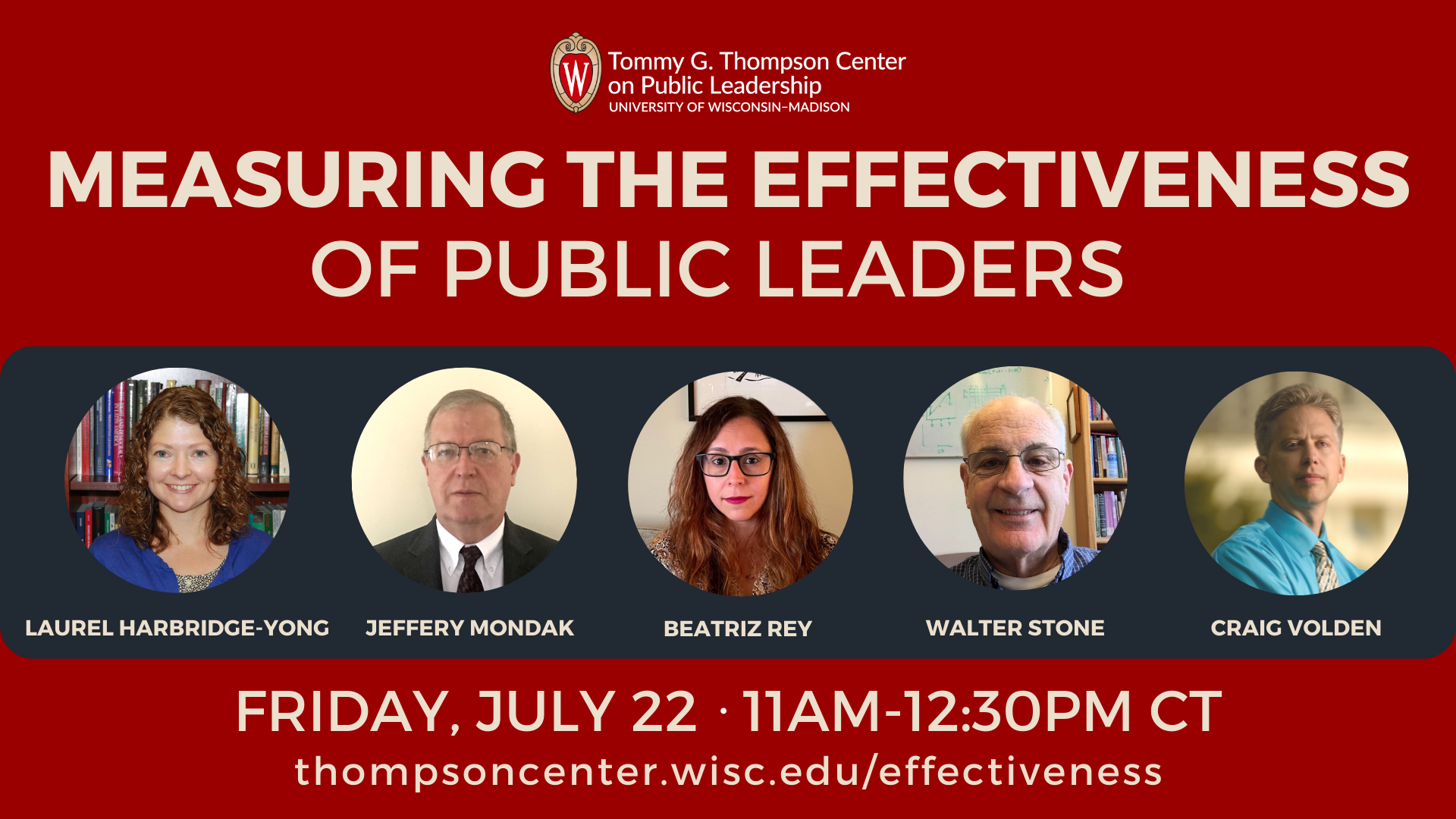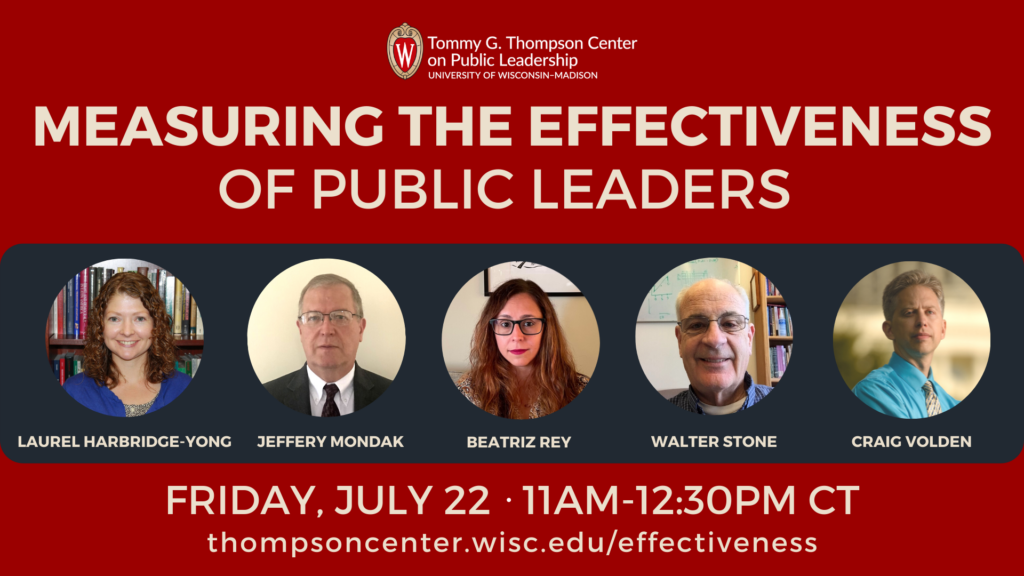
What makes a legislator effective? The Thompson Center invites you to attend a virtual event on July 22, 2022 from 11am-12:30pm CT that will explore the elements of measuring legislative success. Featuring a panel of five speakers, each will share their expertise on lawmaking. Following the speakers’ presentations, there will be an opportunity for audience members to submit Q&A through the Zoom webinar platform.
Register for the Zoom webinar here.
Speakers
 Laurel Harbridge-Yong is an Associate Professor in the Department of Political Science and a Faculty Fellow at the Institute for Policy Research at Northwestern University. She is also a faculty affiliate of the Center for Effective Lawmaking. She received her PhD in 2009 from Stanford University. Her research explores a range of questions surrounding partisan conflict and the difficulty of reaching bipartisan agreements and legislative compromises in American politics. Her research spans projects on the U.S. Congress, state legislatures, and the mass public. She is the author of two books – Is Bipartisanship Dead? Policy Agreement and Agenda-Setting in the House of Representatives (Cambridge University Press, 2015) and Rejecting Compromise: Legislators’ Fear of Primary Voters (with Sarah Anderson and Daniel Butler, Cambridge University Press, 2020) – and numerous journal articles.
Laurel Harbridge-Yong is an Associate Professor in the Department of Political Science and a Faculty Fellow at the Institute for Policy Research at Northwestern University. She is also a faculty affiliate of the Center for Effective Lawmaking. She received her PhD in 2009 from Stanford University. Her research explores a range of questions surrounding partisan conflict and the difficulty of reaching bipartisan agreements and legislative compromises in American politics. Her research spans projects on the U.S. Congress, state legislatures, and the mass public. She is the author of two books – Is Bipartisanship Dead? Policy Agreement and Agenda-Setting in the House of Representatives (Cambridge University Press, 2015) and Rejecting Compromise: Legislators’ Fear of Primary Voters (with Sarah Anderson and Daniel Butler, Cambridge University Press, 2020) – and numerous journal articles.
 Jeffery Mondak is the James M. Benson Chair in Public Issues and Civic Leadership in the Department of Political Science at the University of Illinois. Mondak is the author of nearly one hundred publications, including Personality and the Foundations of Political Behavior (Cambridge University Press), Nothing to Read: Newspapers and Elections in a Social Experiment (University of Michigan Press), and articles in journals in political science, psychology, law, communication, sociology, and neuroscience. Most of his research examines how, and how well, citizens obtain and process information, and use that information to form political judgments and evaluations. Mondak’s research on congressional elections includes a coedited volume about the 2006 elections, Fault Lines: Why the Republicans Lost Congress, and a series of articles regarding the influence of candidates’ nonpolitical attributes on the vote choice, and especially candidates’ levels of competence and integrity; those works appear in the American Journal of Political Science, the Journal of Politics, Political Research Quarterly, and Electoral Studies.
Jeffery Mondak is the James M. Benson Chair in Public Issues and Civic Leadership in the Department of Political Science at the University of Illinois. Mondak is the author of nearly one hundred publications, including Personality and the Foundations of Political Behavior (Cambridge University Press), Nothing to Read: Newspapers and Elections in a Social Experiment (University of Michigan Press), and articles in journals in political science, psychology, law, communication, sociology, and neuroscience. Most of his research examines how, and how well, citizens obtain and process information, and use that information to form political judgments and evaluations. Mondak’s research on congressional elections includes a coedited volume about the 2006 elections, Fault Lines: Why the Republicans Lost Congress, and a series of articles regarding the influence of candidates’ nonpolitical attributes on the vote choice, and especially candidates’ levels of competence and integrity; those works appear in the American Journal of Political Science, the Journal of Politics, Political Research Quarterly, and Electoral Studies.
 Beatriz Rey is a SNF Agora Visiting Fellow at Johns Hopkins University and an APSA Congressional Fellow (2021-2022) working at the U.S. House of Representatives. Her research focuses on legislative politics in a comparative perspective. In particular, her current work examines legislative effectiveness in Brazil and the United States. She holds a Ph.D. in political science from the Maxwell School of Citizenship and Public Affairs at Syracuse University and a M.A. in political science from the University of North Carolina at Chapel Hill. She is also a columnist for the Brazilian Report. Her policy commentary has been featured in outlets such as AP News, BBC Brazil, Estado de S. Paulo, and the Wilson Center.
Beatriz Rey is a SNF Agora Visiting Fellow at Johns Hopkins University and an APSA Congressional Fellow (2021-2022) working at the U.S. House of Representatives. Her research focuses on legislative politics in a comparative perspective. In particular, her current work examines legislative effectiveness in Brazil and the United States. She holds a Ph.D. in political science from the Maxwell School of Citizenship and Public Affairs at Syracuse University and a M.A. in political science from the University of North Carolina at Chapel Hill. She is also a columnist for the Brazilian Report. Her policy commentary has been featured in outlets such as AP News, BBC Brazil, Estado de S. Paulo, and the Wilson Center.
 Walter Stone is Professor Emeritus and Research Professor at UC Davis, where he has taught since 2001. He has also taught at Grinnell College, the University of Colorado, and Stanford University. He is author of Candidates and Voters: Ideology, Valence, and Representation in US Elections (Cambridge 2017) and Coauthor of Republic at Risk (Cambridge 2022) and Three’s a Crowd: The Dynamic of Third Parties, Ross Perot, and Republican Resurgence (Michigan 2005).
Walter Stone is Professor Emeritus and Research Professor at UC Davis, where he has taught since 2001. He has also taught at Grinnell College, the University of Colorado, and Stanford University. He is author of Candidates and Voters: Ideology, Valence, and Representation in US Elections (Cambridge 2017) and Coauthor of Republic at Risk (Cambridge 2022) and Three’s a Crowd: The Dynamic of Third Parties, Ross Perot, and Republican Resurgence (Michigan 2005).
 Craig Volden is Co-Director of the Center for Effective Lawmaking (www.thelawmakers.org). He is a Professor of Public Policy and Politics at the University of Virginia, with appointments in the Frank Batten School of Leadership and Public Policy and the Woodrow Wilson Department of Politics. He studies legislative politics and the interaction among political institutions, with a focus on what policy choices arise from legislative-executive relations and from American federalism. Before joining the Batten School, Prof. Volden taught at The Ohio State University, the Harris School of Public Policy at the University of Chicago, and Claremont Graduate University. His most recent books are Why Bad Policies Spread (And Good Ones Don’t), co-authored with Charles Shipan (2021), and Legislative Effectiveness in the United States Congress: The Lawmakers (winner of the 2015 Fenno Prize and the 2015 Gladys M. Kammerer Award), co-authored with Alan Wiseman.
Craig Volden is Co-Director of the Center for Effective Lawmaking (www.thelawmakers.org). He is a Professor of Public Policy and Politics at the University of Virginia, with appointments in the Frank Batten School of Leadership and Public Policy and the Woodrow Wilson Department of Politics. He studies legislative politics and the interaction among political institutions, with a focus on what policy choices arise from legislative-executive relations and from American federalism. Before joining the Batten School, Prof. Volden taught at The Ohio State University, the Harris School of Public Policy at the University of Chicago, and Claremont Graduate University. His most recent books are Why Bad Policies Spread (And Good Ones Don’t), co-authored with Charles Shipan (2021), and Legislative Effectiveness in the United States Congress: The Lawmakers (winner of the 2015 Fenno Prize and the 2015 Gladys M. Kammerer Award), co-authored with Alan Wiseman.
Moderator
 Eleanor Neff Powell is the Booth Fowler Associate Professor of Political Science at the University of Wisconsin-Madison. She received her Ph.D. from Harvard University, and previously served as an Assistant Professor of Political Science at Yale University before joining the UW-Madison faculty. Her book, Where Money Matters in Congress (Cambridge University Press), examines the influence of money on the internal politics of Congress and the biases it has for the policy-making process. Primarily a Congress scholar, her research revolves around three themes: the influence of money in American politics, understanding political parties, and exploring the complexities of congressional representation. Her research has appeared in the Journal of Politics, the British Journal of Political Science, and Political Science Research and Methods among other journals.
Eleanor Neff Powell is the Booth Fowler Associate Professor of Political Science at the University of Wisconsin-Madison. She received her Ph.D. from Harvard University, and previously served as an Assistant Professor of Political Science at Yale University before joining the UW-Madison faculty. Her book, Where Money Matters in Congress (Cambridge University Press), examines the influence of money on the internal politics of Congress and the biases it has for the policy-making process. Primarily a Congress scholar, her research revolves around three themes: the influence of money in American politics, understanding political parties, and exploring the complexities of congressional representation. Her research has appeared in the Journal of Politics, the British Journal of Political Science, and Political Science Research and Methods among other journals.

